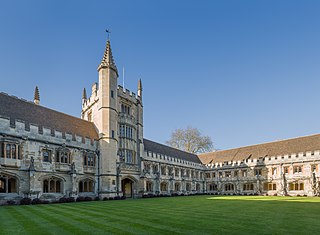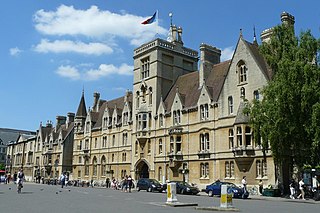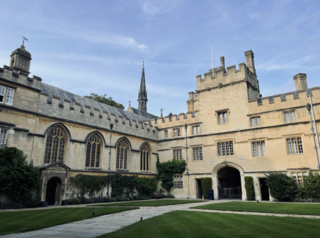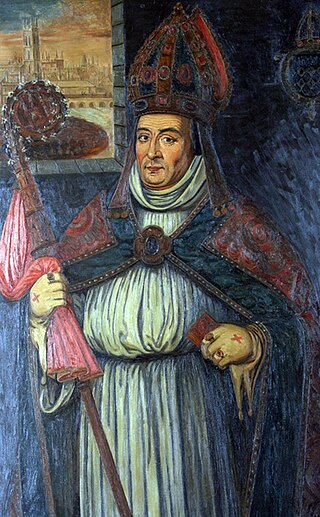
Magdalen College is a constituent college of the University of Oxford. It was founded in 1458 by Bishop of Winchester William of Waynflete. It is one of the wealthiest Oxford colleges, as of 2022, and one of the strongest academically, setting the record for the highest Norrington Score in 2010 and topping the table twice since then. It is home to several of the university's distinguished chairs, including the Agnelli-Serena Professorship, the Sherardian Professorship, and the four Waynflete Professorships.

Balliol College is a constituent college of the University of Oxford. Founded in 1263 by John I de Balliol, it has a claim to be the oldest college in Oxford and the English-speaking world.

Exeter College is one of the constituent colleges of the University of Oxford in England and the fourth-oldest college of the university.

Hertford College, previously known as Magdalen Hall, is a constituent college of the University of Oxford in England. It is located on Catte Street in the centre of Oxford, directly opposite the main gate to the Bodleian Library. The college is known for its iconic bridge, the Bridge of Sighs. There are around 600 students at the college at any one time, comprising undergraduates, graduates and visiting students from overseas.

Jesus College is one of the constituent colleges of the University of Oxford in England. It is in the centre of the city, on a site between Turl Street, Ship Street, Cornmarket Street and Market Street. The college was founded by Queen Elizabeth I of England on 27 June 1571. A major driving force behind the establishment of the college was Hugh Price, a churchman from Brecon in Wales. The oldest buildings, in the first quadrangle, date from the 16th and early 17th centuries; a second quadrangle was added between about 1640 and about 1713, and a third quadrangle was built in about 1906. Further accommodation was built on the main site to mark the 400th anniversary of the college, in 1971, and student flats have been constructed at sites in north and east Oxford. A fourth quadrangle was completed in 2021.

William Waynflete, born William Patten, was Headmaster of Winchester College (1429–1441), Provost of Eton College (1442–1447), Bishop of Winchester (1447–1486) and Lord Chancellor of England (1456–1460). He founded Magdalen College, Oxford, and three subsidiary schools, namely Magdalen College School in Oxford, Magdalen College School, Brackley in Northamptonshire and Wainfleet All Saints in Lincolnshire.
Keith Gilbert Robbins was a British historian and Vice-Chancellor of the University of Wales, Lampeter. Professor Robbins was educated at Bristol Grammar School, Magdalen, and St Antony's College, Oxford.
Theophilus Gale (1628–1678) was an English educationalist, nonconformist and theologian of dissent.
Samuel Parker was an English churchman, of strong Erastian views and a fierce opponent of Dissenters. His political position is often compared with that of Thomas Hobbes, but there are also clear differences; he was also called in his time a Latitudinarian, but this is not something on which modern scholars are agreed. During the reign of King James II he served as Bishop of Oxford, and was considered by James to be a moderate in his attitude to Catholics.

John Piers (Peirse) was Archbishop of York between 1589 and 1594. Previous to that he had been Bishop of Rochester and Bishop of Salisbury.
The White's Chair of Moral Philosophy was endowed in 1621 by Thomas White, Canon of Christ Church as the oldest professorial post in philosophy at the University of Oxford.
Baptist Levinz, sometimes Baptiste or Baptist Levinge, was an Anglican churchman. He is known as a bishop and also for the part he played in the dramatic election at Magdalen College, Oxford.
James Brontë Gatenby was a zoologist notable for his work on the structure of cells and the Golgi bodies.
John Oliver (1601–1661) was an English royalist churchman, President of Magdalen College, Oxford, and Dean of Worcester.
John Parkhurst (1564–1639) was an English clergyman and academic, master of Balliol College, Oxford, from 1617.
John Rouse Bloxam (1807–1891) was an English academic and clergyman, the historian of Magdalen College, Oxford.
Thomas Fairfax, D.D. (1656–1716), was an English Jesuit.
Samuel Foxe (1560–1630), was an English diarist and politician. He was a Member of the Parliament of England for Midhurst in 1589 and for Knaresborough in 1593.

The Whitworth Society was founded in 1923 by Henry Selby Hele-Shaw, then president of the Institution of Mechanical Engineers. Its purposes are to promote engineering in the United Kingdom, and more specifically to support all Whitworth Scholars, the recipients of a scholarship funded by Joseph Whitworth's scholarship scheme, which started in 1868. A Whitworth Scholar is the result of completing a successful Whitworth Scholarship. Membership of the Society is limited to Whitworth Scholars, Senior Scholars, Fellows, Exhibitioners and Prizemen. The Society is a way for making contact with all successful "Whitworths" and provides a way for making information contacts and connections from more senior members to recently successful Scholars. The Society also serves as a way to commemorate Joseph Whitworth and acknowledge his contributions to engineering education.








